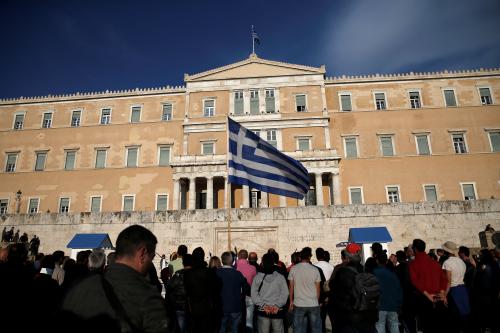Christine Lagarde, in her reaction to the Independent Evaluation Office report regarding the IMF’s response to the crisis in Greece, Ireland and Portugal, stressed that Greece is, or proved to be, a special case. Reading carefully both the report and her comments, one can easily see that the political economy failure of the program is highlighted, especially as regards 2010 to 2012, when the government denied taking ownership of the program, which in turn undermined its adequate and proper implementation. The implication in turn is that the Fund failed to react in time and press the government to implement agreed structural reforms. The IMF also failed to adopt the real spirit of the program and believe in its success.
So, the lopsided implementation of the conditionality program in Greece described in Pelagidis and Mitsopoulos (2014) appears to have emerged as an outcome of the distortion to the program caused in practice by the rent-seeking behavior of Greece’s domestic political system. This distortion primarily came from placing all the burden of adjustment on revenue increasing measures that largely shielded the sprawling state and privileged groups who thrived on growth-suppressing measures included as part of program conditionality. This rent-seeking persisted, even though it risked the success of the program and by soured Greece’s relations with its European partners. What is striking is that the supervising representatives of the official lenders and the Fund in particular accepted, and substantially co-signed, this strategy and for so long. This fact becomes even more surprising considering that, as initially drafted, the conditionality program contained a very balanced mix of fiscal consolidation measures, with tax increases and cost cutting on the one hand, and growth enhancing reforms on the other.
The political economy analysis in particular was absent both in the agreements and the progress reports. This is understandable to some extent, as the mission of the technocrats was to check progress on a list of reforms and not reshape the political system. Considering that political dysfunctions led to the events of 2010 and were instrumental in the reluctance to reform afterwards, neglecting this dimension imperiled the whole undertaking. While the omission on the part of the involved lenders was understandable, it critically undermined the chances of success.
This applies in particular to the IMF, which is supposed to have a lead role with respect to the supervising implementation of the conditionality program. As my 2014 study with Mitsopoulos argued, the explanation for the delay with which the IMF in particular reacted to the one-sided implementation is neither obvious nor simple. It may have to do with political calculations, even though the investigation of the documents related to past IMF missions to Greece may also suggest an alternative explanation. That is, the IMF was never fully convinced of the need to aggressively match austerity with growth enhancing measures as part of a coherent strategy to pull out of a fiscal contraction while avoiding a grave recession or depression, but rather perceived austerity as a prerequisite for the subsequent implementation of growth-enhancing reforms. The Fund may actually not have been alone in such an assumption, as a similar approach becomes evident when observing the reaction of European leaders to the crisis. But while in their case one has to acknowledge that a “growth-enhancing strategy” for Europe inevitably has to deal with the inherent euro zone weaknesses, IMF officials have no such excuse.
The failure to make this analysis and to acknowledge these facts implies that the design, and in particular the implementation during the 2010-2012 period, with its emphasis on increasing taxes on a small number of major contributors to the tax and social security contributions take of the government was essentially self-defeating, as it literally was killing the goose that laid the golden eggs.
That, in turn, led the program to a multi-part manifested as follows:
- Debt unsustainability
- Failure of multipliers initially applied
- Depression, which shut down financing to the private sector hit the productive part of the economy especially hard.
Since January 2015 most of Greece’s old clientelistic political system has metastasized: what prevails now is an awkward coalition of the radical left and radical right. Atop this, a final hit has struck the economy in the form of the comic Varoufakian ‘negotiation’ that finally not only destroyed the two previous programs, but also ushered in capital controls and recession in both 2015 and 2016, along with a third program with a colossal (again) bail out of an estimated 86 billion euros.
So, what remains to be seen is whether both domestic and international actors have learnt from their mistakes, something that is currently far from assured. While the third program is substantively of high technocratic quality and better designed, a tax storm is surprisingly again part of it. One thing is certain: With more than 300 billion euros having given to Greece, my tiny country has become a too big to fail case!







Commentary
Greece and the blame game inside the IMF
August 3, 2016